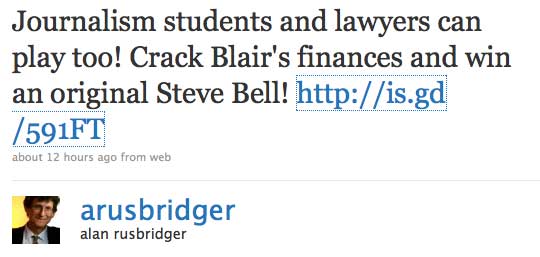Guardian editor Alan Rusbridger strongly believes journalists should link to the specialist source. We’re rather fond of that approach here, so here’s his Hugh Cudlipp lecture in full. There’s a video interview at this link.
There is lots to pull out here, but key were his comments on pay walls – he doesn’t believe it makes commercial or professional sense:
[C]harging might be right for some bits of the Murdoch stable of media properties, but is it right for all bits of his empire, or for everyone else? Isn’t there, in any case, more to be learned at this stage of the revolution, by different people trying different models – maybe different models within their own businesses – than all stampeding to one model?
(…)
As an editor, I worry about how a universal pay wall would change the way we do our journalism. We have taken 10 or more years to learn how to tell stories in different media – ie not simply text and still pictures. Some stories are told most effectively by a combination of print and web. That’s how we now plan our journalism. As my colleague Emily Bell is fond of saying we want it to be linked in with the web – be “of the web”, not simply be on the web.
You can also hear Rusbridger talking about pay walls in Coventry two weeks ago: http://podcasting.services.coventry.ac.uk/podcasting/index.php?id=298
![Reblog this post [with Zemanta]](https://img.zemanta.com/reblog_e.png?x-id=b20979e1-8191-4d6f-91e0-8c61b21d72d5)
